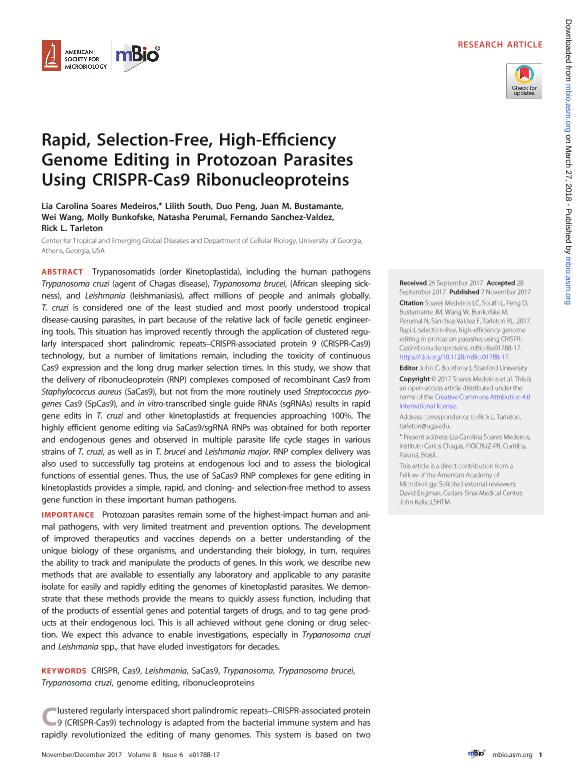Artículo
Rapid, selection-free, high-efficiency genome editing in protozoan parasites using CRISPR-cas9 ribonucleoproteins
Medeiros, Lia Carolina Soares; South, Lilith; Peng, Duo; Bustamante, Juan Manuel ; Wang, Wei; Bunkofske, Molly; Perumal, Natasha; Sánchez Valdéz, Fernando Javier
; Wang, Wei; Bunkofske, Molly; Perumal, Natasha; Sánchez Valdéz, Fernando Javier ; Tarleton, Rick L.
; Tarleton, Rick L.
 ; Wang, Wei; Bunkofske, Molly; Perumal, Natasha; Sánchez Valdéz, Fernando Javier
; Wang, Wei; Bunkofske, Molly; Perumal, Natasha; Sánchez Valdéz, Fernando Javier ; Tarleton, Rick L.
; Tarleton, Rick L.
Fecha de publicación:
07/11/2017
Editorial:
American Society for Microbiology
Revista:
mBio
ISSN:
2161-2129
e-ISSN:
2150-7511
Idioma:
Inglés
Tipo de recurso:
Artículo publicado
Clasificación temática:
Resumen
Trypanosomatids (order Kinetoplastida), including the human pathogens Trypanosoma cruzi (agent of Chagas disease), Trypanosoma brucei, (African sleeping sickness), and Leishmania (leishmaniasis), affect millions of people and animals globally. T. cruzi is considered one of the least studied and most poorly understood tropical disease-causing parasites, in part because of the relative lack of facile genetic engineering tools. This situation has improved recently through the application of clustered regularly interspaced short palindromic repeats-CRISPR-associated protein 9 (CRISPR-Cas9) technology, but a number of limitations remain, including the toxicity of continuous Cas9 expression and the long drug marker selection times. In this study, we show that the delivery of ribonucleoprotein (RNP) complexes composed of recombinant Cas9 fromStaphylococcus aureus (SaCas9), but not from the more routinely usedStreptococcus pyogenes Cas9 (SpCas9), and in vitro-transcribed single guide RNAs (sgRNAs) results in rapid gene edits in T. cruzi and other kinetoplastids at frequencies approaching 100%. The highly efficient genome editing via SaCas9/sgRNA RNPs was obtained for both reporter and endogenous genes and observed in multiple parasite life cycle stages in various strains of T. cruzi, as well as in T. brucei and Leishmania major. RNP complex delivery was also used to successfully tag proteins at endogenous loci and to assess the biological functions of essential genes. Thus, the use of SaCas9 RNP complexes for gene editing in kinetoplastids provides a simple, rapid, and cloningand selection-free method to assess gene function in these important human pathogens. IMPORTANCE Protozoan parasites remain some of the highest-impact human and animal pathogens, with very limited treatment and prevention options. The development of improved therapeutics and vaccines depends on a better understanding of the unique biology of these organisms, and understanding their biology, in turn, requires the ability to track and manipulate the products of genes. In this work, we describe new methods that are available to essentially any laboratory and applicable to any parasite isolate for easily and rapidly editing the genomes of kinetoplastid parasites. We demonstrate that these methods provide the means to quickly assess function, including that of the products of essential genes and potential targets of drugs, and to tag gene products at their endogenous loci. This is all achieved without gene cloning or drug selection. We expect this advance to enable investigations, especially in Trypanosoma cruzi andLeishmania spp., that have eluded investigators for decades.
Archivos asociados
Licencia
Identificadores
Colecciones
Articulos(IPE)
Articulos de INST.DE PATOLOGIA EXPERIMENTAL
Articulos de INST.DE PATOLOGIA EXPERIMENTAL
Citación
Medeiros, Lia Carolina Soares; South, Lilith; Peng, Duo; Bustamante, Juan Manuel; Wang, Wei; et al.; Rapid, selection-free, high-efficiency genome editing in protozoan parasites using CRISPR-cas9 ribonucleoproteins; American Society for Microbiology; mBio; 8; 6; 7-11-2017; e01788-17
Compartir
Altmétricas



